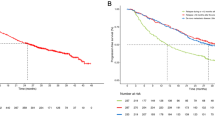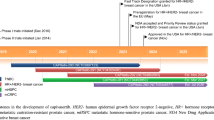Abstract
Background
To compare the prognostic outcomes between first-generation antiandrogen (FGA) and novel androgen-receptor-axis-targeted agent (ARATA) as first-line therapy in patients with non-metastatic castration-resistant prostate cancer (nmCRPC).
Methods
This study retrospectively included a total of 103 consecutive nmCRPC patients consisting of 47 (45.6%) and 56 (54.4%) who received FGA (bicalutamide or flutamide) and ARATA (abiraterone acetate or enzalutamide), respectively, as the first-line agent after the failure of primary androgen deprivation therapy (ADT).
Results
There were no significant differences in the major clinicopathological parameters and previous therapeutic histories between the FGA and ARATA groups. During the observation period, 31 (66.0%) and 29 (51.8%) discontinued first-line therapy in the FGA and ARATA groups, respectively, and of these, 27 (87.1%) and 23 (79.3%) in the FGA and ARATA groups, respectively, were subsequently treated with approved agents as second-line therapy. The prostate-specific antigen (PSA) response rate in the FGA group was significantly lower than that in the ARATA group. Although no significant difference in overall survival was noted between the FGA and ARATA groups, there were significant differences in the PSA progression-free survival on first-line therapy and metastasis-free survival between the two groups, favoring the ARATA group compared with FGA group.
Conclusions
Collectively, these findings suggest that among nmCRPC patients who progressed following treatment with the primary ADT, the introduction of ARATA may result in the delay of disease progression compared with FGA.

Similar content being viewed by others
References
Sharifi N, Gulley JL, Dahut WL (2010) An update on androgen deprivation therapy for prostate cancer. Endocr Relat Cancer 17:R305–R315
Fitzpatrick JM, Bellmunt J, Fizazi K et al (2014) Optimal management of metastatic castration-resistant prostate cancer: highlights from a European Expert Consensus Panel. Eur J Cancer 50:1617–1627
Rozet F, Roumeguère T, Spahn M et al (2016) Non-metastatic castrate-resistant prostate cancer: a call for improved guidance on clinical management. World J Urol 34:1505–1513
Luo J, Beer TM, Graff JN (2016) Treatment of nonmetastatic castration-resistant prostate cancer. Oncology 30:336–344
Smith MR, Saad F, Oudard S et al (2013) Denosumab and bone metastasis-free survival in men with nonmetastatic castration-resistant prostate cancer: exploratory analyses by baseline prostate-specific antigen doubling time. J Clin Oncol 31:3800–3806
Moreira DM, Howard LE, Sourbeer KN et al (2016) Predictors of time to metastasis in castration-resistant prostate cancer. Urology 96:171–176
Smith MR, Saad F, Chowdhury S et al (2018) Apalutamide treatment and metastasis-free survival in prostate cancer. N Engl J Med 378:1408–1418
Hussain M, Fizazi K, Saad F et al (2018) Enzalutamide in men with nonmetastatic, castration-resistant prostate cancer. N Engl J Med 378:2465–2474
Ryan CJ, Crawford ED, Shore ND et al (2018) The IMAAGEN study: effect of abiraterone acetate and prednisone on prostate specific antigen and radiographic disease progression in patients with nonmetastatic castration resistant prostate cancer. J Urol 200:344–352
Mizokami A, Kadono Y, Kitagawa Y et al (2017) Therapies for castration-resistant prostate cancer in a new era: The indication of vintage hormonal therapy, chemotherapy and the new medicines. Int J Urol 24:566–572
Scher HI, Halabi S, Tannock I et al (2008) Design and end points of clinical trials for patients with progressive prostate cancer and castrate levels of testosterone: recommendations of the Prostate Cancer Clinical Trials Working Group. J Clin Oncol 26:1148–1159
Momozono H, Miyake H, Tei H et al (2016) Clinical outcomes of anti-androgen withdrawal and subsequent alternative anti-androgen therapy for advanced prostate cancer following failure of initial maximum androgen blockade. Mol Clin Oncol 4:839–844
Ryan CJ, Smith MR, Fizazi K et al (2015) Abiraterone acetate plus prednisone versus placebo plus prednisone in chemotherapy-naive men with metastatic castration-resistant prostate cancer (COU-AA-302): final overall survival analysis of a randomised, double-blind, placebo-controlled phase 3 study. Lancet Oncol 16:152–160
Beer TM, Armstrong AJ, Rathkopf DE et al (2014) Enzalutamide in metastatic prostate cancer before chemotherapy. N Engl J Med 371:424–433
Penson DF, Armstrong AJ, Concepcion R et al (2016) Enzalutamide versus bicalutamide in castration-resistant prostate cancer: the STRIVE Trial. J Clin Oncol 34:2098–2106
Beheshti M, Rezaee A, Geinitz H et al (2016) Evaluation of prostate cancer bone metastases with 18F-NaF and 18F-Fluorocholine PET/CT. J Nucl Med 57(Suppl 3):55S–560S
Schwarzenboeck SM, Rauscher I, Bluemel C et al (2017) PSMA Ligands for PET Imaging of Prostate Cancer. J Nucl Med 58:1452–1545
Author information
Authors and Affiliations
Corresponding author
Ethics declarations
Conflict of interest
All authors have declared no conflict of interest.
Additional information
Publisher’s Note
Springer Nature remains neutral with regard to jurisdictional claims in published maps and institutional affiliations.
About this article
Cite this article
Miyake, H., Matsushita, Y., Watanabe, H. et al. Comparative assessment of prognostic outcomes between first-generation antiandrogens and novel androgen-receptor-axis-targeted agents in patients with non-metastatic castration-resistant prostate cancer. Int J Clin Oncol 24, 842–847 (2019). https://doi.org/10.1007/s10147-019-01412-2
Received:
Accepted:
Published:
Issue Date:
DOI: https://doi.org/10.1007/s10147-019-01412-2




